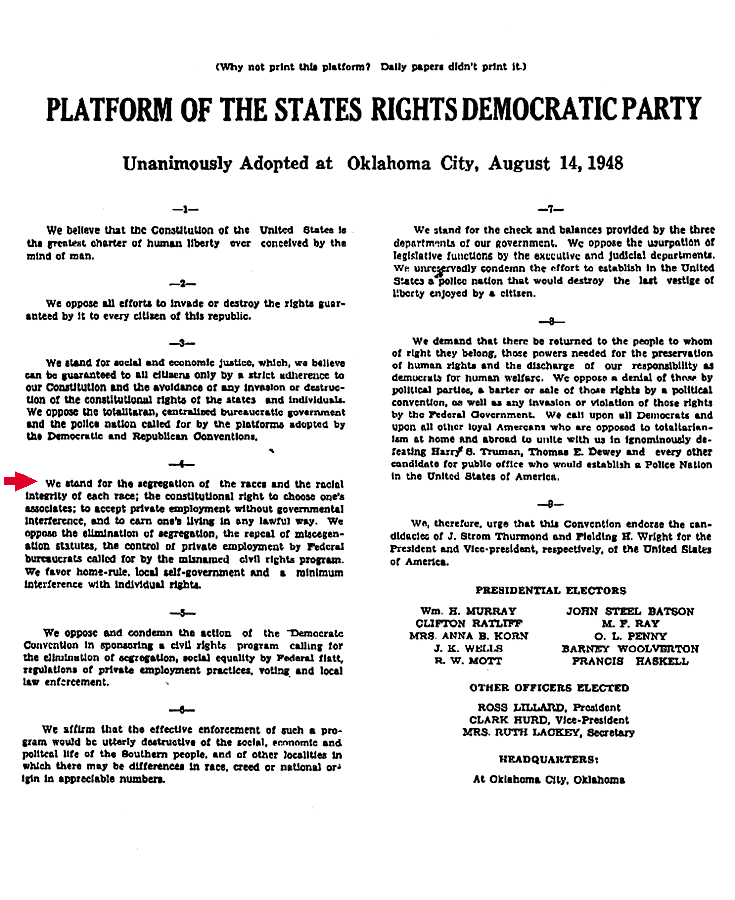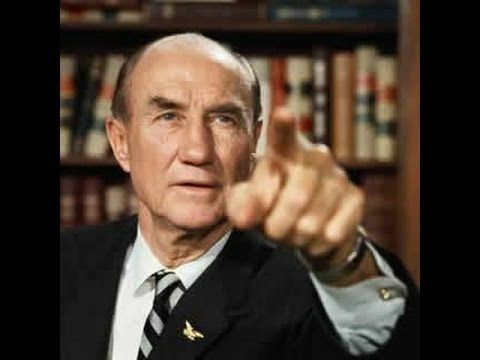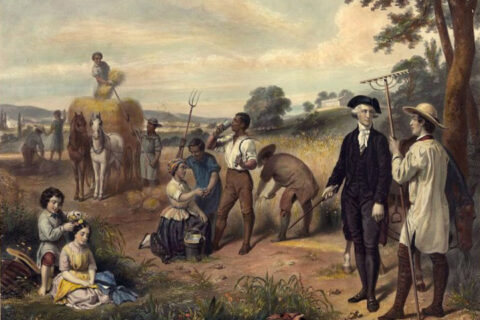The Presidential Election of 1948 bewildered the American Empire and solidified itself in American politics as one of the greatest upsets in the Empire’s political history. Seating Harry Truman in the Oval Office, the news media and polls projected the Republican candidate to win. However, larger forces were at play during the election than basic bipartisanship. A small third party introduced itself in the year of the election. This party called itself the States’ Rights Democratic Party as a protest against the liberalization of the national Democratic Party. Representing the final moments of Southern Nationalism, a memetic descendant of Jeffersonianism, the Dixiecrats attempted to thwart the communist intentions of Northern liberals by costing Truman the election. This essay’s purpose is to describe the background and history, politics, and ramifications of the States’ Rights Democratic Party.
The States Rights’ Democrats manifested from the conservative Solid South’s desire to prevent the Democratic Party from ceding to the whims of the communists which infiltrated the party in the North. The labor movement in the the industrial North during the early 20th century began with good intentions and worked extensively within the Northern faction of the Democratic Party, but the movement became a means for communists to achieve power within the government. By the time Franklin Roosevelt assumed power of the presidency, the far-left and communists had successfully infiltrated the government. Though FDR’s legacy proves his workings with the communists, he also worked diligently with Southern politicians over the New Deal, allowing them to uphold Jim Crow laws and segregation so long as they complied with the many whims of his administration. This kept in line with the previous agreement of sorts the federal government held with Southern governments. So long as the Southern states no longer operated in antagonism against the Empire, the government would allow Southerners to run their states how they saw fit and came into effect at the solidification of the Compromise of 1877, effectively establishing Dixie as a country within a country.
However, the North broke the compromise during the administration of Harry Truman. A native of Missouri, Truman came of age under Jim Crow; however, he betrayed Southerners through his malicious advocacy of what the Leftist Yankees wanted. He began enacting various forms of communist supported Civil Rights legislation and spoke maliciously of his Southern kin. At the Democratic National Convention of 1948, a plethora of Southern statesmen, chiefly from the Deep South, stormed out of the convention in protest against the liberal platform the Democratic Party endorsed and its support of Harry Truman.
This group of Southern men congregated to form the States’ Rights Democratic Party that same year. Standing in staunch opposition to the increasing size and power of the federal government, the Dixiecrats, a nickname they received, campaigned on a platform they, populated heavily of World War II veterans, believed effectively opposed the tyranny of the government and encompassed the ideals of the South. Sweeping much of the Deep South, the party quickly nominated James Strom Thurmond of South Carolina and Fielding Lewis Wright of Mississippi for their ticket’s presidential and vice presidential candidates, respectively. Hoping to cause a contingent election given the little time provided to them, the party garnered a respectable following.

Notice only one point mentioned segregation.
The Dixiecrats relied heavily on the endorsement of important state level figures, notably governors. Receiving the support of powerful men like Leander Perez in Louisiana and several others in Alabama, the party guaranteed itself the votes of four states, including Wright’s Mississippi and Thurmond’s South Carolina, by having itself listed as the Democratic Party on the ballots for each of those states. Unsurprisingly, they failed to win any other Southern State but did win several counties in all former Confederate States, except North Carolina and Texas even though receiving some voter support in those states as well, due to being listed as a third party on the ballot.
Ultimately failing to win beyond a handful of states within the Deep South and failing to secure a contingent election, the Dixiecrat movement dissipated back into mainstream political discourse as its supporters grudgingly returned to the Democratic Party. The return was shortsighted with only a handful, including Leander Perez, predicting an inevitable split between the South and the Democratic Party and encouraging the continued building of the States’ Rights Democratic Party. Resistance continued among Southern Statesmen against the growing tyranny of the federal government after the Dixiecrats’ dissolution. Eisenhower began the process of integrating public spaces, and Brown v Board of Education took place under his presidency. Facing resistance in 1956 in Texas from Governor Allan Shivers who had broken with party loyalty to endorse Eisenhower during his first presidential bid in opposition to the liberalizing Texas Democratic Party, Eisenhower deployed the Army against civilians in Little Rock, Arkansas during the following year, determined not to allow another governor to defy him and being the first president since Lincoln to turn bayonets against American citizens.
Undeterred from the growing bloodthirsty intent from the federal government, many Southerners continued resistance against the government. The Ku Klux Klan carried a number of violent campaigns throughout various states. Additionally, a number of Southern congressmen signed the Southern Manifesto in protest against federal integration. Strom Thurmond infamously held a 24 hour 18 minute filibuster against the Civil Rights Act of 1957.
The primary fallout of the Dixiecrat Party manifested in the collapse of the Solid South. Beginning with the Dixiecrats’ bitter return to the Democratic Party, the conservative faction of the Democrats slowly moved towards the Republican Party, moreso at the federal level instead of the state level. Additionally, Southerners began increasingly voting for Republican presidential candidates. One of the earliest examples of a Southern statesman breaking with party loyalty resided in Texas. Democratic Governor Allan Shivers endorsed Eisenhower for President in 1954. Additionally, Strom Thurmond moved to the Republican Party in 1964 and endorsed Barry Goldwater’s bid for President out of opposition against the Civil Rights Act of 1964 and disgust for the liberalizing of the Democratic Party, believing he could make genuine change within the GOP and one of the earlier Southern Congressman to leave the Democrats in favor of the Republicans.
The embitterment of the conservative Southern Democrats strengthened as they transitioned over to the Republican Party during the 1960s and 1970s with the faction having fully made the move over federally by the 1980s. Carrying a legacy of conservatism, albeit with moderated rhetoric, the former Southern Democrats quietly continued legacies of noteworthy statesmanship. However, Democrats still continued to dominate in many local and gubernatorial Southern elections well into the 1990s, many of whom continued to uphold conservative practices. One of the last examples of this took place in Mississippi when it elected Ronnie Musgrove as governor in 2000.
Since the 1948 Presidential Election, no Southern Nationalist movement manifested nor currently exercises any influence within the political sphere. Southerners, having adopted the perspective of nationalism in support of the Empire, no longer wish to support their own people or cause. Additionally, dissident politics in the South became excluded to sociopaths, social outcasts, and Klansmen following the Civil Rights Movement. A fledgling party, called the Southern Party, cropped up in the 1990s with a moderate amount of success, but by 2001 had collapsed due to infighting. Unfortunately, the possibility of any sort of mass political movement supporting Dixian Nationalism appears far-fetched, though the recent coronavirus pandemic and inevitability of government mismanagement and tyrannical overstepping could generate support for such a movement. Maybe the possibility could for the creation of a new party, such as a States’ Rights Republican Party or some such organization, but the current trajectory of history only allows for the future in which Southerners must ultimately die out as the Empire self-destructs, without so much as their own party or network working for their interests.
“The White people of the South are the greatest minority in this nation. They deserve consideration and understanding instead of the persecution of twisted propaganda.” –Strom Thurmond






To anyone who makes it to the comments, there’s a pretty good book on the topic called The Dixiecrat Revolt and the End of the Solid South by Kari Frederickson.
Well done Joe.
I believe that a party dedicated to destroying both the Democrats and Republicans in the South , a wedge party that insures neither party a clear victory is strategic path forward. Small offices in local, county , and state level elections to begin , then state level offices. Leave national elections alone, maybe throwing support behind someone, for good or ill. A party of disruption, pushing chaos in state and eventually the national electoral process. This is achievable.
As per my essay, I believe we should establish a States’ Rights Republican Party. Though I dislike continued association with the Party of Lincoln, utilizing the moniker of said party would give parts of the populace an easier time establishing the mindset to contribute to it.